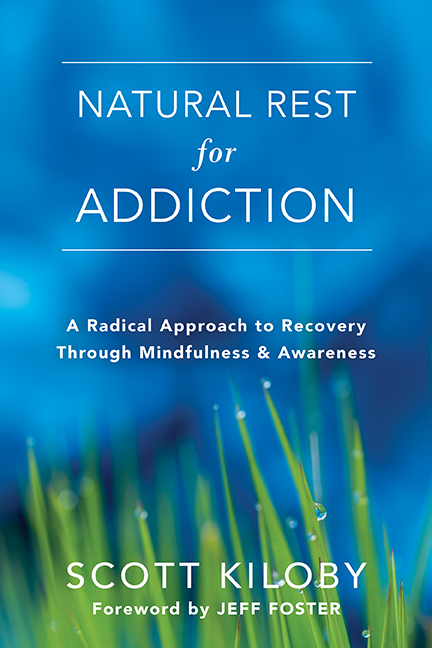by Scott Kiloby, author of Natural Rest for Addiction
One glance at Auguste Rodin’s famous statue Eve After the Fall tells the whole story of how we outwardly manifest our internal feelings of shame. Eve is covering her body and lowering her head as if to say, “Don’t look at me from the outside, for inside I am deeply ashamed of who I am.” Shame is one of those emotions that strikes at the very heart of our identity. Unlike guilt, which is often about feeling bad about something we have done, shame carries negative mental beliefs and corresponding emotions about who we are.
I remember from an early age that shame felt like part of the fabric of my very being. From those first moments of becoming interested in sex to stealing a bit of my dad’s Wild Turkey whiskey to trying tobacco for the first time, I learned that some things have to be kept hidden away from the judgmental eyes of the world. I learned to be addicted by repeatedly returning to the pleasures of substances and activities that helped me cope with feelings that felt overwhelming. Similarly, I learned to be ashamed of those addictions as a way to feel bad about myself. And feeling bad about myself gave me the perfect opportunity to go right back to medicating those shameful feelings. What a vicious cycle! Addiction and shame were inseparable bedfellows for more than thirty years of my life—feeding and fueling each other every step of the way.
I am neither alone nor unique here. The vast majority of clients who participate in treatment at the Kiloby Center for Recovery experience shame as one of the major driving forces behind their insatiable desire to scarf down a box of cookies in one sitting or repeatedly return to the heroin dealer for another hit of oblivion. A new study in Clinical Psychological Science reveals what many of us in the addiction treatment field have known for decades: unresolved shame is a contributing factor to chronic relapsing in addiction.
For those of us experiencing addiction in one form or another, understanding that shame is a major contributing factor to addiction is only half the battle. The more significant question is, How can we resolve shame and therefore begin to truly let go of the addictive substances and activities that are linked to it? Mindfulness is one of the best answers.
With mindfulness, especially if it is somatic based, we have the opportunity to dive deeply into the psychological and emotional imprints of shame in our minds and bodies, and gently and humanely untangle shame’s persistent knots. The great news is that we can do this without any psychoanalysis, because mindfulness uses a different approach altogether. Mindfulness involves recognizing present-moment awareness as the foundation of our experience and gently bringing nonjudgmental and accepting attention to the shame-based thoughts, emotions, and sensations that are buried within our unconscious.
Just learning this skill of mindful, direct attention can resolve quite a lot. But mindfulness affords the opportunity to go even deeper. Because shame is identity based, mindfulness—if done skillfully through self-inquiry—allows us to dismantle the shame-based ego itself, providing an even more profound freedom. Addictions fall away on their own accord, without the need for willpower, when we investigate and dismantle the shame-based ego.
For many, baring their soul in talk therapy or sharing their shameful secrets with a room full of other recovering addicts just isn’t enough to resolve the most deeply rooted shame. That was certainly my experience. I had to find a method of going deeper within myself, to root out all the memories and feelings that kept me leading two lives—the secret, private, addicted “me” that was hiding, lying, and isolating myself from others; and the public façade that presented to everyone else that “all is well.” With mindfulness and self-inquiry, I didn’t have to share anything with anyone. When we are truly ashamed of who we are, it is not so easy to simply share every little dirty secret and shameful memory. Sometimes we have to do some inner processing to relieve ourselves of the heavy burden of shame before we can even open our mouths and share the deepest secrets that have kept us addicted for years.
If you are beginning a mindfulness practice directed at resolving shame, I encourage you to work with someone very skilled at guiding you through the process. This is not for the faint of heart. You may encounter some painful memories and emotions. But diving into these issues with someone who is trained and skilled and can hold the space for you is a path to a depth of freedom that you have never known (and can never know as long as shame runs your life). Watch addictive substances and activities fall away as you watch the thoughts, emotions, and sensations of shame fall away through gentle, direct, skilled mindfulness.
Scott Kiloby is author of Natural Rest for Addiction: A Radical Approach to Recovery Through Mindfulness and Awareness—available now through Non-Duality Press. His other books include The Unfindable Inquiry, Reflections on the One Life, and Living Realization. (To learn more about Scott’s books and his work, check out his Q&A with Non-Duality Press here.)
Scott is co-owner of the Kiloby Center for Recovery in Rancho Mirage, CA, the first addiction treatment center to focus primarily on mindfulness, and co-owner of the Natural Rest House, a detox and residential center in Palm Springs. He is also founder of a worldwide mindfulness training program called the Living Inquiries. For more info, visit http://kilobycenter.com.



 2024 Peace Playbook: 3 Tactics to Avoid Clashes with Your Partner
2024 Peace Playbook: 3 Tactics to Avoid Clashes with Your Partner